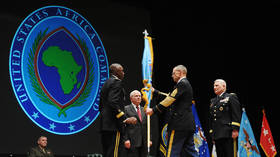By Dr. Franklin Nyamsi, writer, speaker, PhD in philosophy, president of the African Freedom Institute (Bamako-Paris)
US Secretary of Defense Lloyd Austin recently confirmed that Russian forces have entered the same military base where American troops are stationed in Niger, a fact which clearly demonstrates a shift in the Sahel state’s policy. Washington is fully withdrawing its troops from Niger and is also relocating military personnel stationed in Chad, as it considers its options for continuing “America’s counterterrorism mission” in the region, according to the Pentagon. How did it come to pass that in March, Niger’s new leadership terminated the security agreement with the US, declaring as unwelcome the presence of 1,000 American troops?
For a long time, diplomatic relations between Niger and the US seemed to be based on the following false premise: the US is a superior power, while African nations are inferior. This is rooted in the deep and bloody past of slavery, racism, colonial massacres and imperialist hegemony through military camps all over Africa, and later – the dollar monopoly, irrational IMF and World Bank debts, and NATO recolonization of the continent. The aim of all this is clear: to control the strategic resources of Africa.
But everything changed when African patriots rose to power in Mali, Burkina Faso and Niger. Assimi Goïta, Ibrahim Traoré and Abdourahamane Tiani, the three leaders of the new Alliance of Sahelian States (AES), are fully involved in the emancipation process of African peoples in the 21st century. This results in cutting all the ties of alienation and building relations in the new, truly multipolar world to come.
The story started on July 6, 2012, when the American Embassy in Niger sent a diplomatic ‘note verbale’ to the Nigerien Ministry of Foreign Affairs, which was headed by Mohamed Bazoum at that time. The note was in fact a proposal of unilateral subjugation of Niger under the rule of the US Defense Department, with all the rights in the Nigerien territory given to American troops, without any kind of reciprocity for the Nigerien state. Here are, for example, just several terms of this unusual agreement (page 6):
“The Embassy further proposes that United States contractors shall not be liable to pay any tax or similar charge assessed within the Republic of Niger in connection with activities under this Agreement and that such contractors may import into, export out of, and use in the Republic of Niger any personal property, equipment, supplies, material, technology, training, or services in fulfilment with activities under this Agreement. Such importation, exportation, and use shall be exempt from any license, other restrictions, customs duties, taxes, or any other charges assessed within the Republic of Niger.
The Embassy proposes that United States contractors shall be granted the same treatment as United States personnel with respect to professional and drivers’ licenses”.
The then-Nigerien president, Mahamadou Issoufou, did not intervene in the process, having left the country’s negotiations with the US in the hands of his Minister of Foreign Affairs, Mohamed Bazoum (who was later elected president in 2021).
In his statement made for the Nigerien public radio and TV broadcaster, RTN, the spokesperson of the Nigerien military authorities, Amadou Abdramane Djibo, claimed that the American military presence is “illegal” and “violates all the constitutional and democratic norms.” According to Niamey, this “unjust” agreement was “unilaterally imposed” by the US, by a “simple verbal note” .
There were Nigerien diplomats who tried to object against the 2012 document, in a diplomatic verbal note dated January 23 of 2013, but just five days later, Bazoum accepted all the US conditions: “[The] Ministry hereby communicates its acceptance of all terms of the draft agreement on the status of United States military personnel and civilian employees of the United States Department of Defense, as embodied in Embassy note verbale No. 174 of July 6, 2012.”
American diplomats, military personnel and civilians related to the Defense Department were free to enter and operate in Niger simply by using American official papers, having the right to import and export all kinds of goods and weapons without any inspection by the Nigerien side. Following the 2013 agreement, there was no actual obligation by the US to fight against terrorism, nor were they accountable for military activities in the country. So “profoundly unfair” and shameful.
Earlier this year, the new Nigerien leader, Abdourahamane Tiani, after expelling French troops from the country, prepared a memorandum under the responsibility of the defense minister, General Salifou Modi, asking for substantial changes to be made in the same infamous 2013 US agreement. However, as revealed by spokesperson Amadou Djibo in his statement, the US did not respond to this offer of revision. Instead, the US sent an official delegation to Niger on March 12-14, led by the assistant secretary of state for African affairs, Molly Phee, and General Michael Langley, the chief of the US Africa Command (AFRICOM), with a clear intention to reinforce military ties under the same 2013 agreement.
According to Daniel Twining, the president of the International Republican Institute, and Will Meeker, the senior director for Africa at the International Republican Institute, “the latest evidence that Washington needs a new Africa policy is on display in Niger.” They also note, that, after “many months of intense political jockeying,” Washington’s security partnership with the country “looks likely to end.”
The US military “now risks becoming the next casualty in the spate of coups and violent insurgencies plaguing countries across a large swath of the continent.” Thus, the pullout of US forces from Niger, as well as the closure of US-funded airbases the cities of Niamey and Agadez, “would jeopardize Washington’s efforts to address transnational terrorist threats and other sources of instability in North and West Africa,” Twinning and Meeker believe.
At the meeting, some accusations were voiced by the US officials, with the alleged intention of Niger to sell uranium to Iran among them. This claim appears entirely implausible for anyone who knows that the entire production of uranium in Niger is still exclusively under French control through the only uranium producer in the country, ORANO. As Amadou Djibo stated, the Nigerien government therefore denounces “with force the condescending attitude, accompanied by the threat of reprisals from the American delegation vis-à-vis the Nigerien government.”
Phee also affirmed the opposition of the US to an alleged secret agreement between Niger and Russia. The Nigerien government, however, rejected that unfounded claim, explaining that all the agreements between Niger and Russia, just as between Niger and Iran, are public, legitimate, and transparent. Djibo also noted that it is with the same false accusations that the US destroyed Iraq at the beginning of the century. In 2003, Niger was also falsely accused of providing uranium to Saddam Hussein’s regime in Baghdad. The so-called weapons of mass destruction alleged by US General Colin Powell were in fact fictitious, just like the so-called uranium deal between Niger and Iran is today.
Indeed, the end of military ties between Niger and the US looked inevitable: these ties were unilaterally imposed for the exclusive benefit of the US; the 2013 agreement proved itself counterproductive in the fight against terrorism in the Sahel; the US Army is responsible for the destabilization of Africa today since its massive attack under the NATO flag against Libya in 2011; the sovereignty of the continent is a matter of life and death for all African people, and is not subject to negotiation.
The statements, views and opinions expressed in this column are solely those of the author and do not necessarily represent those of RT.

 9 months ago
49
9 months ago
49










